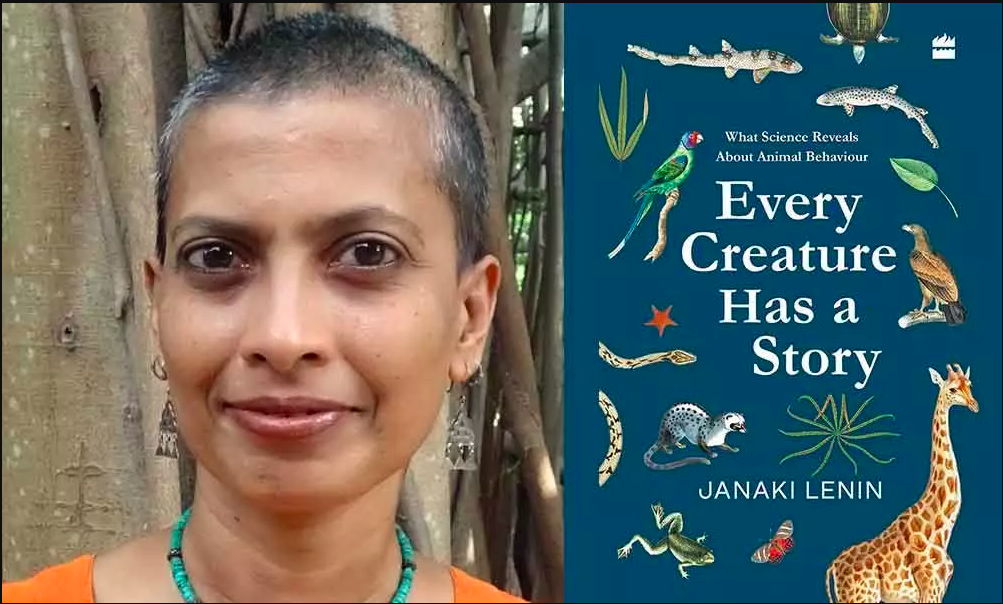Frontlist Authors | No strangers in the wild: Janaki Lenin on her latest book, Every Creature Has a Story
Frontlist Authors | No strangers in the wild: Janaki Lenin on her latest book, Every Creature Has a Storyon Jul 21, 2020

Did you know rodents practice monogamy or that plants fight off predators? Author-journalist Janaki Lenin explores the human-animal connect in her latest book, Every Creature Has a Story.
Chimpanzees mourn the death of a loved one, rodents practise monogamy — all traits that are similar to us, humans. As I talk to Janaki Lenin about her latest book, Every Creature Has a Story, I learn more fascinating parallels. I am catching up with the author two years after the release of her second book, My Husband & Other Animals 2, and she tells me the new one is a spin-off, though “my husband [Rom Whitaker, wildlife conservationist and founder of the Madras Snake Park] doesn’t feature in it. The style is completely different too, as there is a certain formality to the language as I draw from scientific journals.” The compilation of 50 essays (picked from over a 100 written for The Wire in 2015) delve into the many unique behavioural patterns found in the wild. The essays started taking shape when she finished My Husband & Other Animals 2 and began looking for something new to write on. A piece she did on creatures who leave their natal homes got her exploring the science of animal behaviour. “As a child I was traumatised by the idea of leaving my parental home when I got married. I found it unfair, and it had a huge impact on me,” says Lenin, 50, who embarked on a “great big research safari, looking at so many different animal species, primarily those closely related to humans”. The discoveries were plenty: from elephants being immune to cancer and plants that secrete juices to ward off predators to disease immunity in bees. “[The human] civilisation is not as unique as we think. The more urbanised we get, the more alienated we feel from our fauna relatives, which leads to all sorts of dysfunctions, such as thinking that humans are superior and animals have a right to life only if they are of some use to us.” She is quick to clarify, however, that while she engages with scientific studies, she is critical and perceives them as an outsider. “It is like a two-way conversation I am having with scientists and there is an indirect pressure from the reader that drives me to ask questions,” says Lenin, who doesn’t have a science background and admits she had to “push the boundaries of my own limitations”.
A group of gelada (bleeding-heart monkey) babies | Photo Credit: Kalyan Varma
The “underestimated” world of plants has got its due, too. The essay, Plants with Private Armies (the only one on flora in the book), looks at how, when in distress, several species secrete sugary liquids to attract ants. “Everyone imagines plants to be helpless things, but they fight back in different ways that we don’t see. If a tree is hurt, it signals others in its vicinity with a smell — something almost animal-like. Curry leaves have that distinct flavour [as a defence mechanism] because they don’t want to be eaten,” she says.
A pair of giraffes | Photo Credit: Janaki Lenin
Lessons from your balcony
Based on her observations during the lockdown, Lenin says people on social media talked a lot about watching nature from their balconies. “The crisis has paused their lives and they are now observing birds visiting, new flowers and even spiders.” She believes this could be a beginning of forging a new bond with nature. “People say paying attention to nature is like meditating. I don’t meditate but I get my inner peace from nature. I hope people carry forward this connection with nature in the new normal,” she concludes. Published by HarperCollins India, Every Creature Has a Story releases on July 27 and is priced at ₹599. It is available for pre-order on amazon.in.
animals
Book
chimpanzee
creature
elephant
Environment
every creature has a story
evolution
Frontlist
Frontlist Articles
Frontlist Books
HarperCollins India
humans
Janaki Lenin
my husband and other animals
plant life
Romulus Whitaker
science
science studies
scientfic journals
wildlife



.jpg)






.jpg)

.jpg)
.jpg)

.jpg)
.jpg)
.jpg)










Sorry! No comment found for this post.